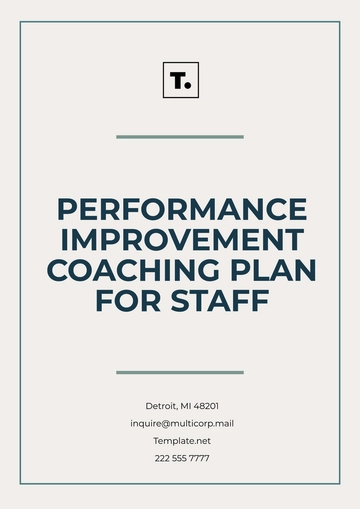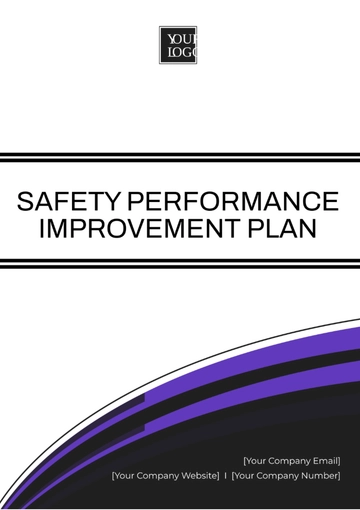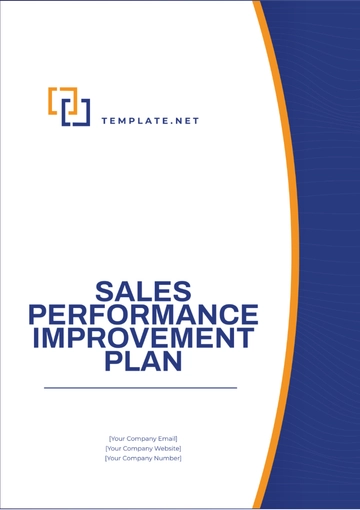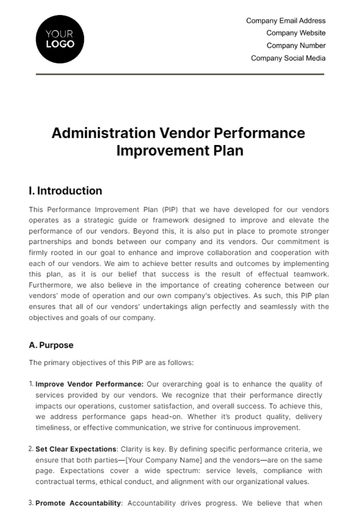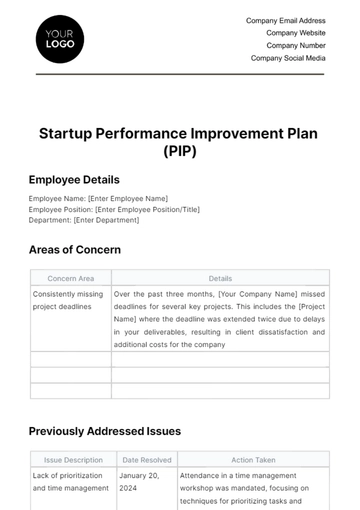Free Sales Performance Improvement Plan
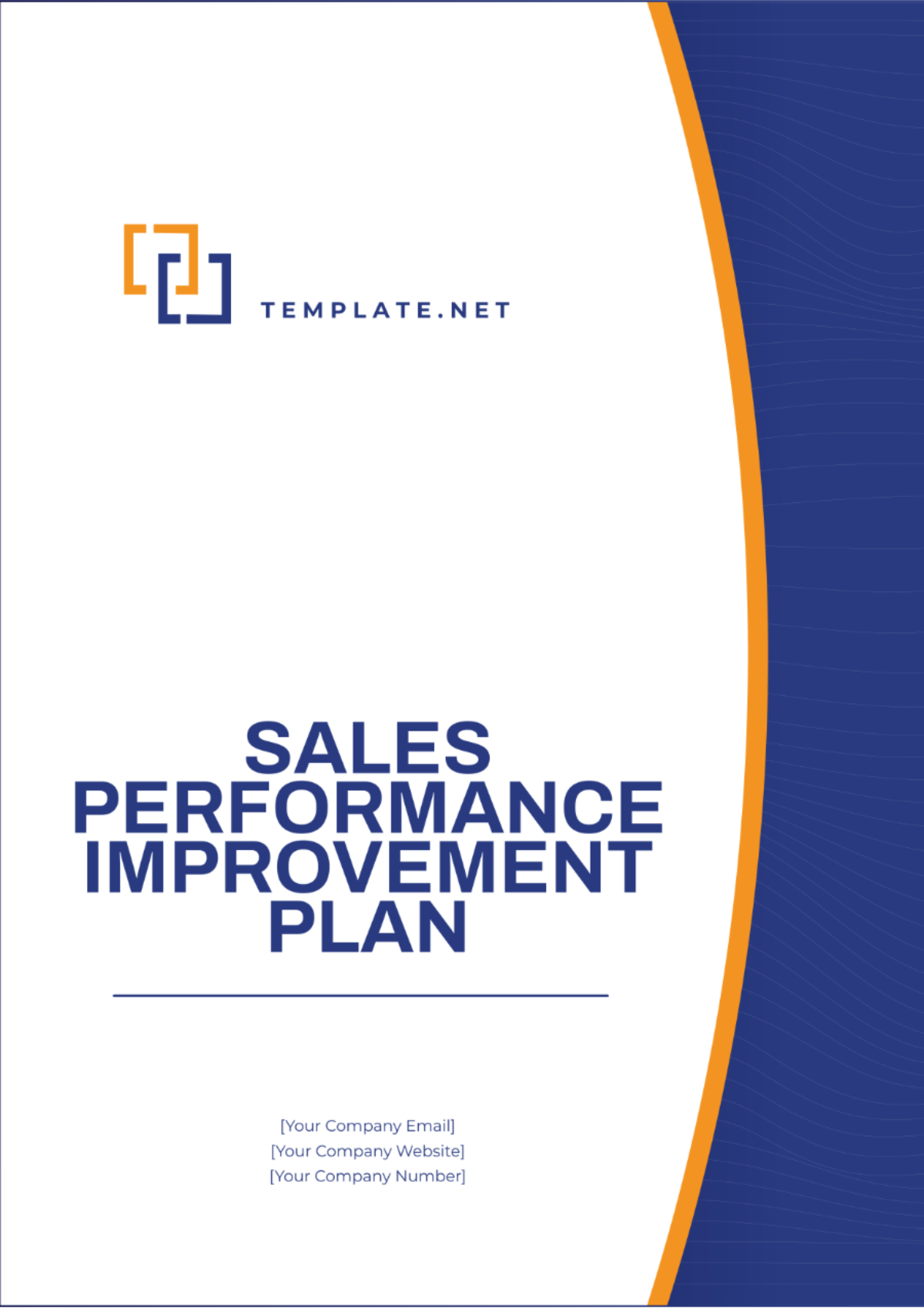
Prepared By: | [Your Name] |
Department: | [Your Department] |
Date: | [Date] |
I. Executive Summary
This Sales Performance Improvement Plan aims to boost our sales team's performance by outlining strategic initiatives, setting specific goals, and detailing actionable steps. It functions as a guide to pinpoint improvement areas, apply effective strategies, and track success, ultimately enhancing sales efficiency, productivity, and outcomes through thorough market analysis and structured performance metrics.
II. Specific Goals
Increase monthly sales revenue by 15% within 6 months.
Improve lead conversion rate by 10% within 3 months.
Enhance customer retention rate by 5% within 12 months.
Expand market share by entering the digital services market within the next 18 months.
III. Market Analysis
A. Current Market Position
[Your Company Name] is presently maintaining a market share of 20% within the technology solutions industry, where it encounters significant competition from key industry players including [Competitor A], [Competitor B], and [Competitor C].
B. SWOT Analysis
Strengths | Weaknesses | Opportunities | Threats |
|---|---|---|---|
Strong brand reputation for innovative solutions. Expert sales team. | The company has a restricted presence in emerging markets. | There is an increasing demand for cloud-based computing solutions. | Competitive pricing from rivals like [Competitor A], [Competitor B], and [Competitor C] |
Extensive distribution network. | Outdated sales technology. | Emerging industry sectors like IoT and cybersecurity. | Economic downturns impact IT spending. |
IV. Strategic Approaches
To accomplish our designated objectives, we are committed to implementing the subsequent strategic approaches:
Enhance Sales Training Programs:
Develop and implement advanced training modules focused on improving product knowledge, sales techniques, and customer engagement skills.
Conduct regular workshops and seminars to enhance negotiation skills and objection-handling strategies.
Introduce mentorship programs pairing experienced sales reps with new hires to facilitate knowledge transfer and skill development.
Implement Advanced CRM Tools:
Evaluate and select a robust CRM platform tailored to the company's needs, emphasizing features such as lead tracking, customer segmentation, and analytics.
Provide comprehensive training to sales teams on CRM usage, data entry best practices, and leveraging CRM insights for targeted sales strategies.
Integrate CRM with other business systems (marketing automation, ERP) to streamline processes and ensure data consistency across departments.
Optimize Lead Generation Tactics:
Conduct a thorough analysis of lead generation channels (e.g., inbound marketing, referrals, events) to identify high-performing channels and areas for improvement.
Implement targeted marketing campaigns leveraging data-driven insights from CRM and analytics tools.
Develop and test personalized messaging and offers to improve lead quality and conversion rates.
Focus on Customer Relationship Management:
Implement customer segmentation strategies based on purchasing behavior, preferences, and demographics to tailor offerings and communication.
Establish proactive customer support initiatives to address issues promptly and enhance overall customer satisfaction.
Leverage customer feedback mechanisms (surveys, feedback sessions) to gather insights for product/service improvements and refine sales strategies.
V. Actionable Tactics
A. Sales Training Initiatives
Develop and execute comprehensive training programs focused on improving product knowledge, negotiation skills, and closing techniques.
Sales Training Initiatives | Training Program | Target Audience | Timeline |
|---|---|---|---|
Product Knowledge Workshops | Comprehensive training program | Sales Representatives | [Start Date] - [End Date] |
Advanced Negotiation Seminars | Focused seminars | Senior Sales Staff | [Start Date] - [End Date] |
Sales Techniques Mastery Course | Intensive course with role-playing | Sales Managers | [Start Date] - [End Date] |
Customer Engagement Workshop | Interactive sessions on rapport building | Sales and Customer Support | [Start Date] - [End Date] |
B. CRM Implementation
Introduce and integrate a robust CRM platform to streamline sales processes and improve customer engagement and retention.
CRM Feature | Start Date | Responsible Team |
|---|---|---|
Integrate lead-tracking functionality | [Start Date] | IT and Sales |
Implement customer segmentation tools | [Start Date] | Marketing and Sales |
Configure automated workflows for sales processes | [Start Date] | IT and Sales |
Transfer existing customer data to the CRM platform | [Start Date] | IT and Data Team |
Set up reporting dashboards and analytics tools | [Start Date] | Sales and Analytics Team |
VI. Sales Team Structure
The sales team will be restructured to improve efficiency and align with our strategic goals:
Sales Director: The Sales Director is a vital leadership role tasked with managing the company's sales strategies and operations, setting targets, orchestrating plans, leading the sales team, and collaborating with other departments to meet business objectives.
Regional Sales Managers: Regional Sales Managers oversee and support sales teams within specific areas, setting sales goals, implementing strategies, and ensuring team success, while also providing coaching and guidance to boost individual and team performance.
Sales Representatives: Sales Representatives are key sales professionals who build customer relations, identify opportunities, and close deals, playing a vital role in meeting sales targets and driving revenue growth.
Sales Support Staff: Sales Support Staff are vital for smooth sales operations, handling administrative tasks like managing data, preparing reports, coordinating meetings, and assisting with customer inquiries and logistics to boost team efficiency and focus.
VII. Performance Metrics
Key performance indicators (KPIs) will be tracked to measure the success of our sales strategies:
Monthly Sales Revenue
Amount: $500,000
Lead Conversion Rate
Number of converted leads: 100
Total number of leads: 500
Lead Conversion Rate: (100 / 500) x 100 = 20%
Customer Retention Rate
Number of customers at start of period: 1000
Number of new customers acquired during the period: 200
Number of customers at end of period: 1100
Customer Retention Rate: ((1100 - 200) / 1000) x 100 = 90%
Market Penetration Rate
Number of customers in the target market: 500
Total number of potential customers in the target market: 1000
Market Penetration Rate: (500 / 1000) x 100 = 50%
VIII. Adaptability Strategies
To remain flexible and responsive to market changes, our sales plan will incorporate periodic reviews and adjustments. Key strategies include:
A. Quarterly Performance Reviews
Purpose: Conduct comprehensive reviews of sales performance, KPIs, and goal achievements every quarter.
Actions:
Analyze sales metrics such as revenue, conversion rates, and customer retention.
Evaluate the effectiveness of sales strategies and initiatives.
Identify areas of improvement and success to inform future planning.
B. Feedback Loop from Sales Teams
Purpose: Establish a structured feedback mechanism to gather insights and suggestions directly from sales teams.
Actions:
Conduct regular meetings or surveys to collect feedback on sales processes, tools, and strategies.
Encourage open communication to address challenges and implement improvements.
Use feedback to refine training programs, sales approaches, and overall sales operations.
C. Continuous Market Research
Purpose: Stay informed about market trends, customer preferences, and competitive landscape to make informed business decisions.
Actions:
Monitor industry trends, competitor activities, and customer feedback through surveys, interviews, and data analysis.
Identify emerging opportunities, potential threats, and market shifts.
Use market insights to adapt sales strategies, target new market segments, and refine product/service offerings.
IX. Resource Allocation
Realistic allocation of resources will be essential to execute the plan successfully:
A. Budget
Specify budget amount: $500,000
Sales Training Programs: $100,000
Develop and execute comprehensive training programs for sales representatives, including workshops, seminars, and online training resources.
CRM Implementation: $150,000
Invest in a robust CRM platform tailored to the company's needs, including software licenses, customization, integration, and training.
Marketing Campaigns: $100,000
Allocate funds for targeted marketing campaigns, including digital marketing, advertising, promotions, and lead generation activities.
Technology and Tools: $50,000
Purchase and maintain essential sales tools and technology such as sales automation software, analytics tools, and communication platforms.
Personnel Training and Development: $100,000
Provide ongoing training, certifications, and skill-building programs for sales and support staff.
B. Tools
Advanced CRM: Implement a robust CRM system with advanced tools to enhance sales tracking, manage customer interactions, and provide comprehensive data analysis for strategic decision-making.
Analytical Software: Allocate resources to acquire analytical tools that are capable of examining sales data, tracking customer trends, and evaluating performance metrics, thereby equipping your team with the necessary insights for making well-informed decisions.
C. Personnel
Training Experts: Hire or engage training professionals to develop and conduct comprehensive sales training programs focused on product knowledge, sales techniques, and CRM usage.
IT Support: Allocate IT resources to implement and maintain CRM systems, provide technical support to sales teams, and ensure data security and integration.
Marketing Advisors: Collaborate with marketing experts to align sales strategies with marketing initiatives, develop targeted campaigns, and leverage customer insights for sales growth.
By following this Sales Performance Improvement Plan, we aim not only to meet but exceed our business objectives, driving growth and ensuring long-term success for [Your Company Name].
- 100% Customizable, free editor
- Access 1 Million+ Templates, photo’s & graphics
- Download or share as a template
- Click and replace photos, graphics, text, backgrounds
- Resize, crop, AI write & more
- Access advanced editor
Boost your sales team’s effectiveness with Template.net's Sales Performance Improvement Plan Template. This customizable and editable template helps outline strategies for improvement. Editable in our AI Editor Tool, it provides the flexibility to tailor the plan to your team's goals. Drive performance and achieve better results with this strategic and practical tool designed for sales success.
You may also like
- Finance Plan
- Construction Plan
- Sales Plan
- Development Plan
- Career Plan
- Budget Plan
- HR Plan
- Education Plan
- Transition Plan
- Work Plan
- Training Plan
- Communication Plan
- Operation Plan
- Health And Safety Plan
- Strategy Plan
- Professional Development Plan
- Advertising Plan
- Risk Management Plan
- Restaurant Plan
- School Plan
- Nursing Home Patient Care Plan
- Nursing Care Plan
- Plan Event
- Startup Plan
- Social Media Plan
- Staffing Plan
- Annual Plan
- Content Plan
- Payment Plan
- Implementation Plan
- Hotel Plan
- Workout Plan
- Accounting Plan
- Campaign Plan
- Essay Plan
- 30 60 90 Day Plan
- Research Plan
- Recruitment Plan
- 90 Day Plan
- Quarterly Plan
- Emergency Plan
- 5 Year Plan
- Gym Plan
- Personal Plan
- IT and Software Plan
- Treatment Plan
- Real Estate Plan
- Law Firm Plan
- Healthcare Plan
- Improvement Plan
- Media Plan
- 5 Year Business Plan
- Learning Plan
- Marketing Campaign Plan
- Travel Agency Plan
- Cleaning Services Plan
- Interior Design Plan
- Performance Plan
- PR Plan
- Birth Plan
- Life Plan
- SEO Plan
- Disaster Recovery Plan
- Continuity Plan
- Launch Plan
- Legal Plan
- Behavior Plan
- Performance Improvement Plan
- Salon Plan
- Security Plan
- Security Management Plan
- Employee Development Plan
- Quality Plan
- Service Improvement Plan
- Growth Plan
- Incident Response Plan
- Basketball Plan
- Emergency Action Plan
- Product Launch Plan
- Spa Plan
- Employee Training Plan
- Data Analysis Plan
- Employee Action Plan
- Territory Plan
- Audit Plan
- Classroom Plan
- Activity Plan
- Parenting Plan
- Care Plan
- Project Execution Plan
- Exercise Plan
- Internship Plan
- Software Development Plan
- Continuous Improvement Plan
- Leave Plan
- 90 Day Sales Plan
- Advertising Agency Plan
- Employee Transition Plan
- Smart Action Plan
- Workplace Safety Plan
- Behavior Change Plan
- Contingency Plan
- Continuity of Operations Plan
- Health Plan
- Quality Control Plan
- Self Plan
- Sports Development Plan
- Change Management Plan
- Ecommerce Plan
- Personal Financial Plan
- Process Improvement Plan
- 30-60-90 Day Sales Plan
- Crisis Management Plan
- Engagement Plan
- Execution Plan
- Pandemic Plan
- Quality Assurance Plan
- Service Continuity Plan
- Agile Project Plan
- Fundraising Plan
- Job Transition Plan
- Asset Maintenance Plan
- Maintenance Plan
- Software Test Plan
- Staff Training and Development Plan
- 3 Year Plan
- Brand Activation Plan
- Release Plan
- Resource Plan
- Risk Mitigation Plan
- Teacher Plan
- 30 60 90 Day Plan for New Manager
- Food Safety Plan
- Food Truck Plan
- Hiring Plan
- Quality Management Plan
- Wellness Plan
- Behavior Intervention Plan
- Bonus Plan
- Investment Plan
- Maternity Leave Plan
- Pandemic Response Plan
- Succession Planning
- Coaching Plan
- Configuration Management Plan
- Remote Work Plan
- Self Care Plan
- Teaching Plan
- 100-Day Plan
- HACCP Plan
- Student Plan
- Sustainability Plan
- 30 60 90 Day Plan for Interview
- Access Plan
- Site Specific Safety Plan
